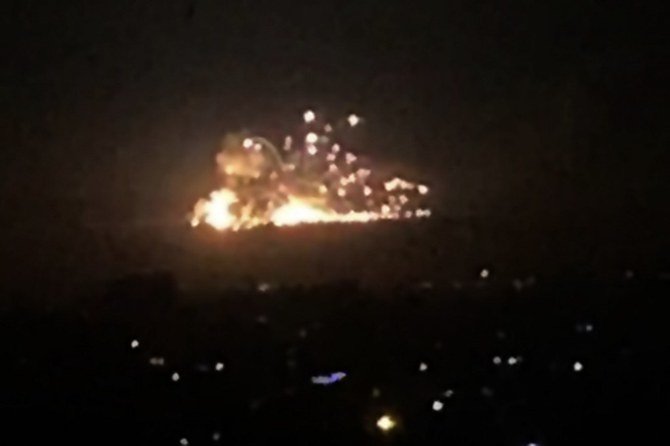
- ARAB NEWS
- 14 Jul 2025

Israel inflicted several blows on the Iranian regime in 2019, including in the last week, with cruise missiles reportedly launched towards Iranian and Syrian military positions near the latter’s capital, Damascus.
In August and November, the Israel Defense Forces (IDF) struck dozens of Iranian targets in Syria, and carried out a series of airstrikes in northern Baghdad a few months ago. According to reports, several Iranians have been killed and wounded in these airstrikes.
The Islamic Republic is known for immediate retaliation, usually resorting to military responses power in such situations. But on these strikes, the regime has remained silent. The only response coming out of Tehran is heightened rhetoric.
Abbas Nilforoushan, the deputy commander of operations of the Islamic Revolutionary Guard Corps (IRGC), threatened in an interview with the Iranian news agency Tasnim: “Israel is not in a position to threaten Iran. Iran has encircled Israel from all four sides. Nothing will be left of Israel.” Another deputy commander, Hossein Salami, called Tel Aviv “vulnerable and bringing itself closer to death.”
This begs the question why Iran has not yet responded militarily to Israel’s airstrikes against its bases and proxies in Syria and Iraq. The main reason lies in the fact that the Iranian authorities are currently fighting for their own survival, as the regime is mired with various problems and has been cornered from every possible direction.
Tehran has not faced so many challenges at once since its establishment in 1979. Domestically speaking, the regime appears to be in a constant state of emergency. For every round of protests that it crushes with brute force, the next one spreads.
In the latest demonstration, around 1,500 people were killed by security forces, including, according to Reuters: “At least 17 teenagers and about 400 women, as well as some members of the security forces and police.”
Even some officials and commanders have asserted that the government’s hold on power is in danger. That is why the Supreme Leader Ayatollah Ali Khamenei called on security forces to crush the protesters: “You have my order. Do whatever it takes to end it.”
On the global stage, the US withdrawal from the nuclear deal and the subsequent re-imposition of sanctions on energy, banking and financial sectors have imposed significant pressure on the Islamic Republic.
Dr. Majid Rafizadeh
Unemployment is high, inflation continues to skyrocket, and the currency is crashing. The Statistical Center for Iran (SCI) reported that the country’s overall inflation rate is 47.2 percent, with the inflation rate for food and fuel as high as 63.5 percent. This means that the cost of living has increased by almost 50 percent in 2019 while wages remained the same, and many out of work.
The Iranian regime has also been closely monitoring social media outlets to detect calls for demonstrations across the country. Last week, the authorities restricted access to the internet and shut down mobile connectivity ahead of potential protests — which, with many wishing to commemorate those who lost their lives in November, are only intensifying.
Regionally speaking, the regime is also having a difficult time maintaining its strategic advantage, popularity and influence in the Shiite communities in Arab states, particularly in Iraq and Lebanon, where people have also been protesting against Iranian proxies and interference. Six Gulf countries have also joined hands to impose sanctions on banks, individuals and dozens of corporations, which are linked to Tehran’s support for militant groups, including Hezbollah.
On the global stage, the US withdrawal from the nuclear deal and the subsequent re-imposition of sanctions on energy, banking and financial sectors have imposed significant pressure on the Islamic Republic.
Due to the US policy of “maximum pressure” as well as the Trump administration’s decision not to extend its waiver for Iran’s eight biggest oil buyers — China, India, Greece, Italy, Taiwan, Japan, Turkey and South Korea — Tehran’s economy has taken a major beating. The regime is finding it extremely difficult to pursue its military adventurism and fund its proxies across the region.
European powers have also been mirroring Washington’s campaign. France, Germany and the UK have stepped up pressure on Iran over uranium enrichment and centrifuge development. The EU has also pressured Tehran for its ballistic missile activity, declaring “Iran’s developments of nuclear-capable ballistic missiles and related technologies is inconsistent” with its obligations under UN resolution 2231.
In sum, Iran has been silent amid the IDF’s attacks on it because there is little, really, it can do. The regime has to prioritize its resources as it fights for its survival on all fronts, domestically and abroad.
Dr. Majid Rafizadeh is an Iranian-American political scientist and president of the International American Council. Twitter: @Dr_Rafizadeh.